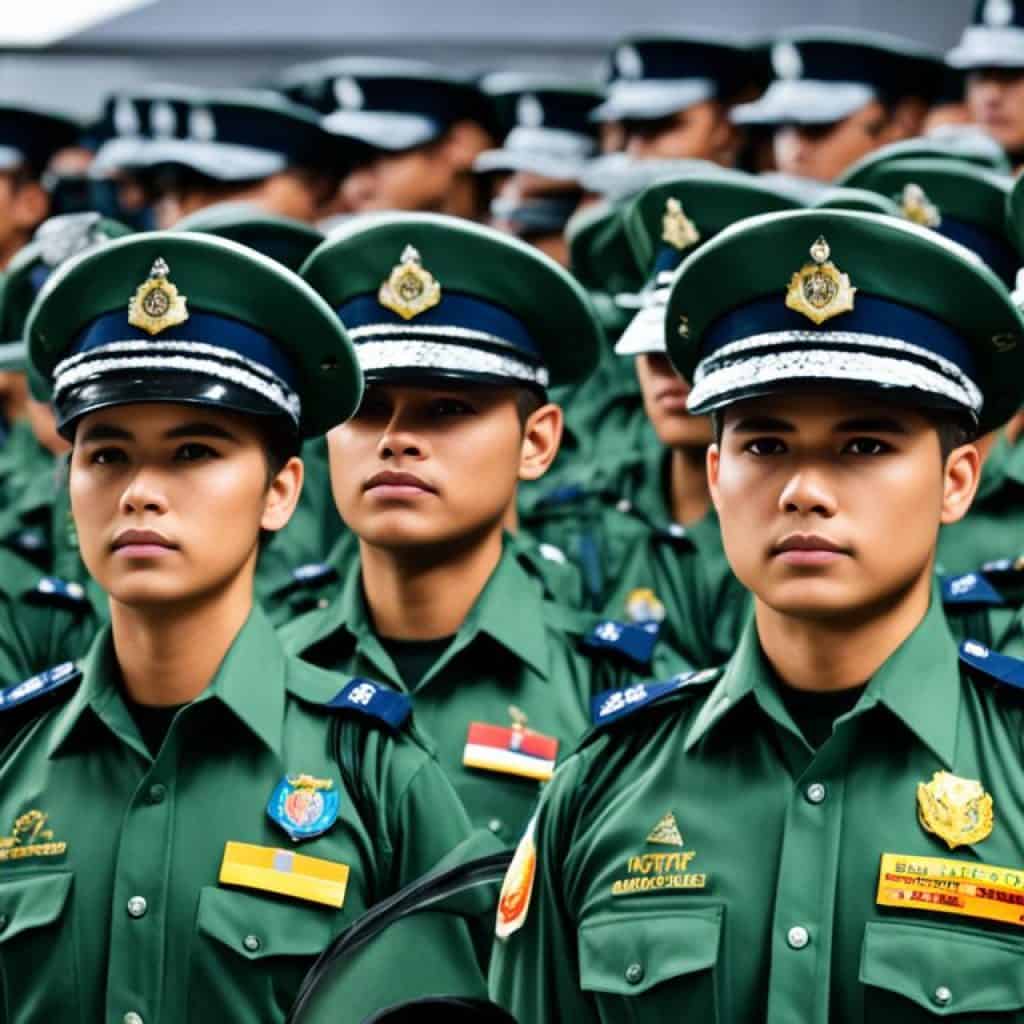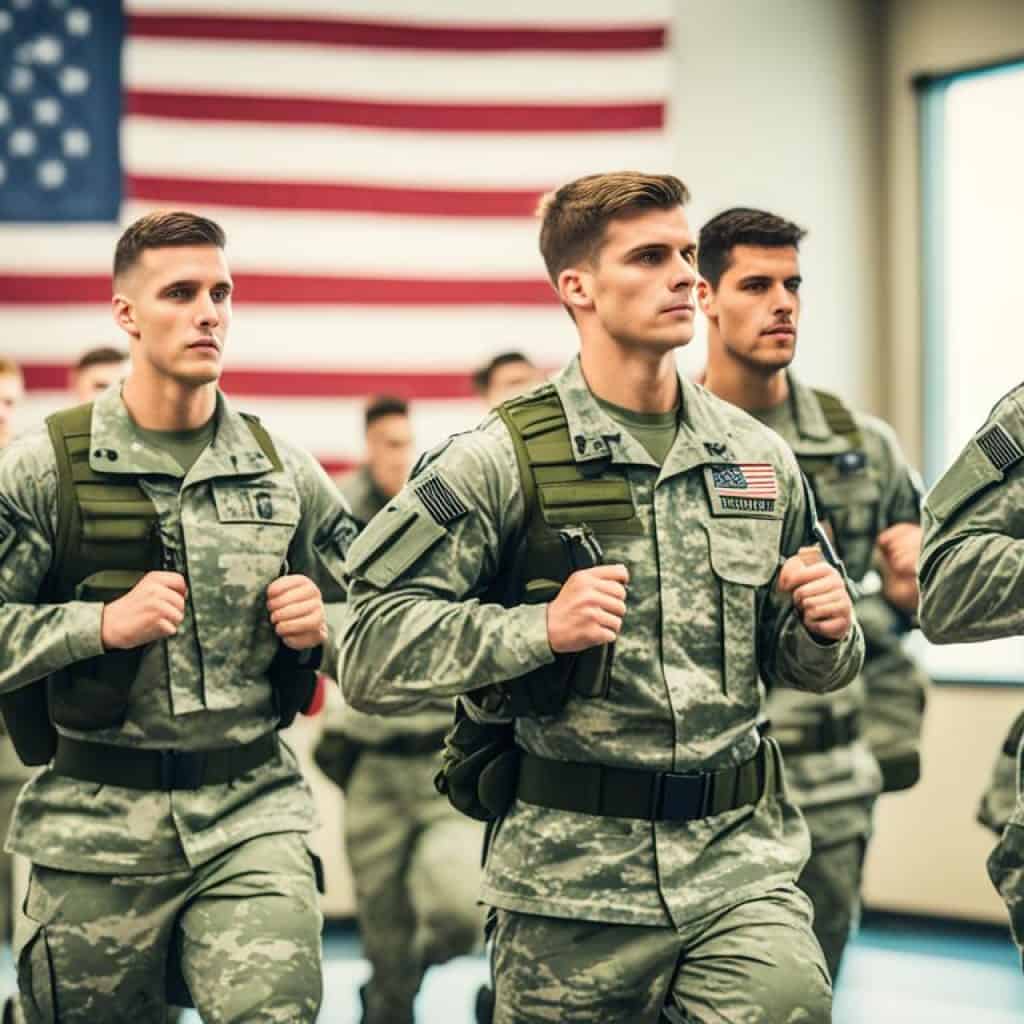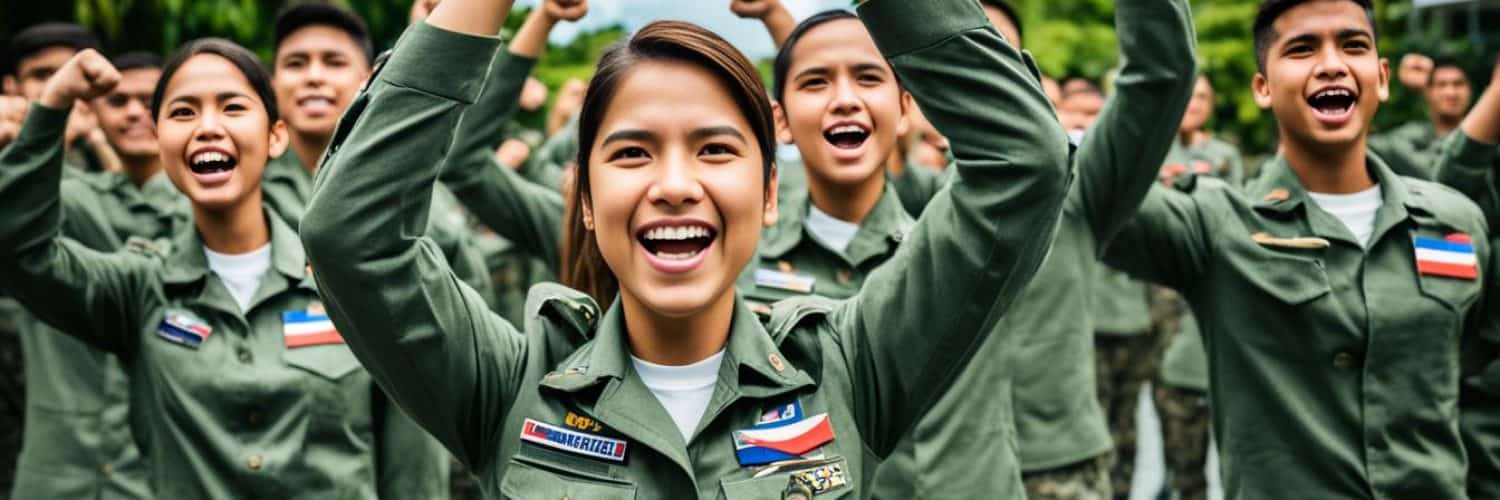Should Reserve Officers’ Training Corps (ROTC) be made mandatory in the Philippines? As discussions heat up around the revival of mandatory ROTC, diverse perspectives emerge regarding its potential benefits and drawbacks. While some believe that mandatory ROTC is crucial for shaping disciplined and patriotic youth for national development, others raise concerns about added expenses, burden on students, culture of violence and corruption, fake nationalism, threat to academic freedom, and violation of domestic and international laws.
Key Takeaways:
- Mandatory ROTC in the Philippines is a topic of intense debate.
- Advocates argue that it shapes disciplined and patriotic youth for national development.
- Opponents raise concerns about added expenses, burden on students, and culture of violence and corruption.
- Mandatory ROTC raises questions about fake nationalism, threat to academic freedom, and violation of domestic and international laws.
- A comprehensive examination of mandatory ROTC and exploring alternative approaches is necessary to empower the youth.
Added Expenses and Waste of Public Funds
The implementation of mandatory ROTC would require parents and students to bear additional expenses. These expenses encompass the cost of ROTC uniforms, gears, food, transportation, and other contributions. Students attending private schools would also face the burden of extra tuition and fees. However, opponents argue that these added expenses pose a significant financial strain on low-income families. Moreover, they assert that the funds allocated for mandatory ROTC could have been better utilized to address pressing issues within the education system, such as classroom shortages, inadequate textbooks, teacher shortages, and the retrofitting of schools.
Added Burden on Students and Teachers
One of the key concerns surrounding the implementation of mandatory ROTC is the significant burden it places on both students and teachers. As an additional subject, ROTC requires students to allocate more time and effort, affecting their rest, recreation, family life, and potential livelihood. This increased time commitment poses a challenge for students who are already burdened by the academic load of the K-12 curriculum.
The physical demands of the ROTC program further contribute to the challenges faced by students. The rigorous training and physical activities can have a negative impact on students’ well-being, potentially leading to physical exhaustion, injuries, and mental fatigue. These physical demands, combined with the existing workload, can put additional strain on students’ overall health and academic performance.
Teachers also face an increased workload as a result of mandatory ROTC. With the current lack of teaching personnel due to the ongoing COVID-19 pandemic, the inclusion of ROTC as a compulsory subject would further stretch teachers’ capacity to deliver quality education. The preparation, instruction, and assessment required for the ROTC program add to the already demanding workload of teachers, potentially compromising the quality of education they can provide to their students.
Elevating Student Well-being
Raising the mandatory ROTC time commitment and physical demands can negatively impact students’ overall well-being and academic performance. It is crucial to prioritize the welfare of students and ensure that their educational experience remains balanced and supportive.
Recognizing the importance of students’ well-being, it is imperative to strike a balance between academic and extra-curricular commitments. By considering alternatives to mandatory ROTC, schools can explore options that foster physical fitness, discipline, and leadership skills without adding excessive burden to students. This could include offering a variety of elective programs, sports activities, and community service opportunities that allow students to develop important skills while still maintaining a reasonable workload.
In addition, providing support and resources to teachers is essential in addressing the increased workload associated with mandatory ROTC. Hiring additional teaching personnel, providing professional development opportunities, and implementing effective strategies for workload management can help ensure that teachers can fulfill their roles effectively while maintaining their own well-being.
| Impact on Students | Impact on Teachers |
|---|---|
|
|

The added time commitment of mandatory ROTC can impact students’ well-being and academic performance.
Making informed decisions about the implementation of mandatory ROTC requires a careful consideration of the impact it has on both students and teachers. It is essential to prioritize student well-being, balancing their academic obligations with their physical and mental health. Likewise, supporting teachers and addressing their increased workload is crucial in ensuring the delivery of quality education.
Culture of Violence and Corruption
The ROTC program in the past has witnessed alarming incidents of violence, hazing, abuse, and corruption. Students enrolled in ROTC have experienced physical assaults, verbal attacks, and even sexual assault, undermining the supposed purpose of fostering discipline and patriotism. These acts of violence not only harm students physically and emotionally but also breed a culture of fear and intimidation within ROTC units.
Corruption within the ROTC program has also tarnished its reputation. Instances of bribery, questionable contributions, and misused funds have come to light, casting doubt on the integrity of the program. One notable case that exposed the extent of corruption was the murder of student activist Mark Chua. Chua’s courage in revealing corruption within ROTC shed light on the urgent need for reform and influenced the decision to make ROTC optional in 2002.
| Type of Misconduct | Incidents |
|---|---|
| Violence and Hazing | Multiple cases of physical assault, hazing rituals, and verbal abuse against ROTC cadets. |
| Abuse and Sexual Assault | Reports of students being subjected to various forms of abuse and sexual assault within the ROTC program. |
| Corruption | Instances of bribery, questionable financial contributions, and misappropriation of funds within ROTC units. |
The prevalence of violence, hazing, abuse, and corruption within ROTC units raises serious concerns about the program’s efficacy in cultivating values of discipline, integrity, and patriotism. The need for comprehensive reform and stricter oversight is evident to ensure the safety and well-being of students involved in ROTC, safeguarding their rights and fostering an environment free from violence and corruption.
Promotes Fake Nationalism
Critics argue that mandatory ROTC does not guarantee genuine nationalism. They believe that the National Service Training Program offers alternative ways for students to engage in nation-building.
Citizen Welfare Training Service (CWTS)
The Citizen Welfare Training Service is a component of the National Service Training Program that focuses on community development and social welfare activities. It encourages students to actively participate in community service projects, such as assisting in disaster relief efforts, organizing outreach programs, and promoting environmental conservation.
Literary Training Service (LTS)
The Literary Training Service is another component of the National Service Training Program that aims to promote literacy and cultural awareness. Through activities such as storytelling, creative writing workshops, and theater performances, students can develop their communication skills and gain a deeper understanding of their cultural heritage.
To foster true nationalism, critics suggest strengthening the instruction of history, national language, humanities, and culture subjects in the education curriculum. By providing students with a comprehensive understanding of their country’s history, values, and traditions, they believe that a genuine sense of nationalism can be instilled.
Threat to Academic Freedom
The commanding role of the military in the ROTC program poses a significant threat to academic freedom, limiting the autonomy of school administrators and teachers. Their ability to design and operate school programs is encroached upon, infringing on their right to decide teaching methods and curriculum. This encroachment undermines the principles of academic freedom, stifling creativity and innovation within educational institutions.
The program’s emphasis on blind obedience contradicts the goal of fostering critical thinking among students, hindering their intellectual development and ability to analyze complex issues. Academic freedom is essential for cultivating independent thought, encouraging students to question, challenge, and explore different ideas and perspectives.
The presence of the military in the education system raises concerns about potential surveillance and repression of individuals who may be viewed as enemies of the government. Such surveillance has the potential to curtail freedom of expression, hinder open dialogue, and impede the pursuit of knowledge and truth.
“Academic freedom is the cornerstone of higher education institutions. It allows educators to teach, researchers to explore, and students to learn without undue interference. The encroachment of ROTC into academic affairs undermines this fundamental principle, inhibiting the intellectual growth and critical thinking necessary for a well-rounded education.” – Dr. Maria Santos, Professor of Education
Academic freedom is not only essential for the personal growth and development of students but also for the progress and advancement of society as a whole. It is through the free exchange of ideas and the promotion of critical thinking that societies can address complex challenges, innovate, and make informed decisions. Protecting academic freedom is crucial in ensuring that educational institutions remain spaces of intellectual exploration and discovery.
| Threats to Academic Freedom in Mandatory ROTC |
|---|
| Limitation on school administrators’ ability to design and operate programs |
| Infringement on the rights of teachers to decide teaching methods |
| Suppression of critical thinking skills among students |
| Potential surveillance and repression of individuals deemed as enemies of the government |
Safeguarding Academic Freedom
To preserve the integrity of academic freedom, it is vital to resist any encroachment that limits the independence of educational institutions. Stakeholders, including teachers, administrators, students, and civil society, must advocate for the protection of academic freedom and challenge any attempts to undermine it. This can be achieved through:
- Raising awareness about the importance of academic freedom
- Engaging in open dialogue and discussions on the potential consequences of mandatory ROTC
- Mobilizing support for policies that safeguard academic freedom
- Working towards reforms that ensure educational institutions remain autonomous spaces for intellectual development
By actively safeguarding academic freedom and encouraging critical thinking, educational institutions can play a transformative role in shaping well-rounded individuals who are capable of analyzing complex issues, contributing to societal progress, and upholding democratic values.
Violation of Domestic and International Laws
Making ROTC mandatory for senior high school students raises concerns about the recruitment of minors. This practice goes against the Optional Protocol to the Convention on the Rights of the Child, which the Philippines has ratified. Compulsory ROTC also violates domestic laws such as the Special Protection of Children Against Abuse, Exploitation and Discrimination Act, and the Special Protection of Children in Situations of Armed Conflict Act. These laws aim to protect children and prohibit their involvement in armed conflict.
Philippine National Police (PNP) Support
The Philippine National Police (PNP) is a strong advocate for the mandatory implementation of the Reserve Officers’ Training Corps (ROTC) program, recognizing its role as a foundation for instilling patriotism, nationalism, and discipline in the youth. The PNP believes that ROTC not only develops military skills but also fosters values necessary for law enforcement, disaster response, the rule of law, and the protection of civil rights. By introducing subjects that complement basic military science, such as law enforcement and disaster response, the PNP emphasizes the importance of creating a well-rounded reserve force capable of upholding and defending the nation’s institutions and sovereignty.

“ROTC builds the foundation for patriotism and discipline while also equipping our youth with the necessary skills to protect and serve our country. It serves as a platform to cultivate future leaders who understand the rule of law and are prepared to uphold civil rights in the face of challenges.”
Call to Abolish ROTC
Opposition to mandatory ROTC continues to grow, with student councils, publications, organizations, and concerned citizens across the Philippines leading a campaign for its abolition. The strong call against ROTC is driven by the belief that the program perpetuates violence and abuse, reinforces a culture of impunity, and takes a reactionary stance against students who fight for their rights and welfare.
One significant concern often raised by opponents of ROTC is the presence of military traditions within universities. Critics argue that using campuses for military training is inconsistent with the purpose of academic institutions, violating both International Humanitarian Law and domestic laws protecting children. Students should feel safe on campus, free from the influence of military structures that may compromise their education and well-being.
The campaign against ROTC also emphasizes the importance of upholding International Humanitarian Law. The use of academic institutions for military purposes is viewed as a violation of these laws, which seek to safeguard the welfare and rights of individuals in times of armed conflicts. By opposing mandatory ROTC, advocates strive to protect the principles enshrined in International Humanitarian Law and promote a safer and more inclusive educational environment.
Students should be able to pursue their education without fear of violence, abuse, or infringement upon their rights. Abolishing mandatory ROTC is an essential step towards creating campuses that prioritize peace, respect, and the well-being of every individual.
The call to abolish ROTC is aligned with broader movements that promote peace, human rights, and democratic values. It seeks to address the inherent power dynamics and potential for abuse within the program. By advocating for the abolition of ROTC, these diverse groups aim to create a more inclusive and nurturing educational system that upholds the rights and dignity of every student.
| Key Arguments Against ROTC | Supporting Points |
|---|---|
| Perpetuates violence and abuse | – History of reported cases involving hazing, harassment, and even murder – Erodes students’ sense of safety and well-being |
| Military traditions inside universities | – Inconsistent with the purpose of academic institutions – Contravenes International Humanitarian Law and domestic laws protecting children |
| Violation of International Humanitarian Law | – Use of academic institutions for military purposes goes against the principles safeguarding individuals in times of armed conflicts |
Abolishing mandatory ROTC is a crucial step in ensuring that students can pursue their education in a safe and nurturing environment. It affirms the commitment to human rights, nonviolence, and the well-being of all individuals within the educational system.
Inherent Problems with ROTC
Critics of the ROTC program highlight several inherent problems that undermine its effectiveness in shaping disciplined and patriotic youth. These issues expose the program’s weaknesses and raise concerns about its impact on democratic rights, corruption, sexism, and human rights violations.
Military Traditions in ROTC
One of the main criticisms of the ROTC program is the presence of military personnel who use it as a platform for conducting operations within universities. This blurs the line between educational and military institutions, potentially compromising the academic environment and infringing upon students’ rights.
The Students Intelligence Network (SIN)
An alarming development within the ROTC program is the establishment of the Students Intelligence Network (SIN), a monitoring network targeting progressive student and youth leaders. The existence of such a network raises concerns about the violation of democratic rights and the stifling of dissent among young individuals.
Threats to Democratic Rights
The mandatory nature of the ROTC program can create an environment that restricts students’ freedom of expression and critical thinking. Critics argue that the program promotes blind obedience and may be used as a tool to suppress individuals who question authority or advocate for change.
Corruption and Sexism
Corruption has been a persistent issue within the ROTC program, with reports of bribery, misused funds, and questionable contributions. Additionally, some critics argue that the program perpetuates sexism and reinforces stereotypical gender roles, which can be detrimental to gender equality and inclusivity.
Human Rights Violations
There are concerns that the ROTC program may be prone to human rights violations, including cases of abuse and assault against students. Instances of violence, hazing, and ideological bigotry within the program raise significant ethical concerns and call for a reassessment of its implementation.

These inherent problems with the ROTC program call into question its effectiveness and its ability to instill important values in the youth. Addressing these concerns is crucial to ensure the development of a program that truly fosters discipline, patriotism, and respect for democratic rights and human dignity.
Injustice and Abuse
The history of the ROTC program is marred by cases of harassment, abuse, and even murder. Students have reported incidences of violence and hazing, leading to physical and emotional harm. The murder of UST student Mark Chua, who exposed corruption in the program, further illustrates the need to protect students’ welfare and democratic rights. Mandatory ROTC is seen as a potential catalyst for increased abuse and violation of students’ rights.
Call for a Overhaul
Critics argue that making mandatory ROTC the solution to instilling love of country and good citizenship is ineffective. Instead, they advocate for a total overhaul of the current educational system. They propose a scientific, nationalist, and mass-oriented education as an alternative to the colonial, commercialized, and fascist nature of the existing system.
| Features of Overhauled Education System | Description |
|---|---|
| Scientific Education | Revised curriculum emphasizing critical thinking, problem-solving, and evidence-based learning in all disciplines. |
| Nationalist Education | In-depth understanding of Philippine history, culture, heritage, and values, fostering a genuine sense of patriotism and love for the country. |
| Mass-Oriented Education | Education accessible to all, with equal opportunities for quality learning and skills development, irrespective of socioeconomic background. |
In this envisioned educational system, students would gain not only academic knowledge but also the necessary skills and values to contribute meaningfully to society. By nurturing critical thinking, instilling a love for the nation, and promoting equal educational opportunities, this alternative system aims to empower the youth to become active and responsible citizens.
Call to Action
Join the student activism movement and take a stand against the revival of mandatory ROTC in the Philippines. Various student councils, publications, organizations, and formations in universities and colleges are coming together to oppose this proposal. We urge President Rodrigo Duterte to reconsider the decision to make ROTC mandatory and instead abolish ROTC as an educational program. It’s time to amplify our voices and fight against violence and fascism in the Philippine educational system.
Here’s how you can get involved:
- Participate in campaigns, activities, and forums organized by student-led organizations.
- Engage in congressional hearings and share your concerns about the revival of mandatory ROTC.
- Join protest actions and demonstrations to show solidarity with the alliance against ROTC revival.
- Spread awareness by sharing educational materials and information regarding the negative impact of mandatory ROTC.
Together, we can make a difference and protect the rights and well-being of students in the Philippines. Let your voice be heard and join the campaign against mandatory ROTC today!
Future of Mandatory ROTC
Despite the strong opposition to mandatory ROTC, the focus now shifts towards the future of this program in the education curriculum. The resounding voice of critics and concerned citizens calls for the scrapping of proposed legislations and measures aimed at reviving mandatory ROTC. Instead, they urge the government to prioritize addressing pressing concerns in the education sector.
One of the immediate priorities is to allocate an increased education budget to meet the growing demands and challenges faced by students and teachers. This includes addressing shortages in classrooms, books, and teaching personnel. By investing in education, the government can ensure that students have access to quality learning environments and resources.
Another crucial aspect is the retrofitting of schools to ensure safe reopening in the wake of the COVID-19 pandemic. Adequate measures need to be taken to create a conducive learning environment that prioritizes the health and well-being of students and staff. This includes implementing protocols for social distancing, sanitization, and ventilation systems.
“The government’s focus should be on providing students with a safe and nurturing environment for learning, rather than imposing mandatory ROTC. Our children’s well-being and education should be the top priority.”
Student Concerns
Student concerns must be taken into account when considering the future of mandatory ROTC. It is essential to listen to their voices and address their anxieties. Students express their worries about the additional burden and time commitment that mandatory ROTC imposes. They are concerned about the impact it may have on their overall well-being, academic performance, and future employment prospects.
Furthermore, students express fears related to the potential culture of violence and corruption that may prevail within the ROTC program. They value their safety and are keen on ensuring that any educational program they are part of aligns with their principles and moral beliefs.
In light of these concerns, it is crucial for the government to re-evaluate the inclusion of mandatory ROTC in the education curriculum. Prioritizing the needs and wants of the students is paramount to fostering a positive and inclusive learning environment.
Government Actions for Education
As the discussion on mandatory ROTC continues, government actions for education should focus on providing students with educational opportunities that prioritize their well-being, personal development, and academic success. This involves creating a comprehensive educational system that caters to the diverse needs of students, nurturing critical thinking, and fostering a sense of civic responsibility.
Inspiring a generation of students who are engaged in nation-building can be achieved through various initiatives such as enhancing the teaching of national history, culture, and humanities subjects. By educating students about their rich heritage and the values that shape their identity, they will develop a genuine sense of nationalism and pride in their country.
By investing in innovative teaching methods and providing teachers with ongoing professional development, the government can ensure that students receive a high-quality education. This includes empowering teachers to foster critical thinking skills, inspire creativity, and promote a holistic approach to learning.
| Student Concerns | Government Actions for Education |
|---|---|
|
|
Conclusion
The mandatory Reserve Officers’ Training Corps (ROTC) in the Philippines has sparked a passionate debate about how to best shape disciplined and patriotic youth for national development. Proponents argue that ROTC instills important values of patriotism and nationalism, while opponents raise valid concerns about added expenses, burden on students, culture of violence and corruption, fake nationalism, threat to academic freedom, and violation of laws.
It is clear that there are diverse perspectives on the implementation of mandatory ROTC. This discussion highlights the need for a comprehensive examination of the program and the exploration of alternative approaches to empower the youth.
While ROTC may have its merits in terms of fostering discipline and a sense of duty, it is crucial to address the concerns raised by opponents. National development and youth empowerment can be achieved through diverse means that take into account the financial capabilities of families, the physical and emotional well-being of students, and the protection of democratic rights.
As the conversation continues, it is important to consider the holistic development of the Filipino youth and seek solutions that balance the benefits of ROTC with the need for inclusive education that respects diversity, promotes critical thinking, and equips students with the necessary skills for the challenges of the future.


















Add comment